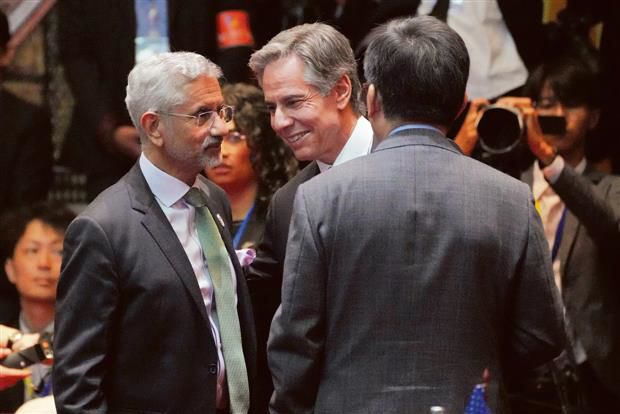Code of conduct for South China Sea critical for peace: S Jaishankar
Ajay Banerjee
New Delhi, July 27
External Affairs Minster S Jaishankar stressed the need for a substantive and effective code of conduct to secure sea lines of communication in the South China Sea, which, he said were critical for peace and stability of the Indo-Pacific region, amid growing concerns about China’s maritime coercion.
Discusses trafficking of Indian techies
The EAM called on Laos PM Sonexay Siphandone and took up the issue of trafficking of Indian nationals by cybercriminals. He said, “Appreciate the ongoing cooperation of Laos in the rescue and relief of our citizens. Also discussed the matter with the foreign ministers of Cambodia and Thailand.”
“A code of conduct should be substantive and effective, consistent with international law and should not prejudice legitimate rights and interest of nations not party to discussions,” Jaishankar said while speaking at the 14th East Asia Summit Foreign Ministers meeting at Laos.
A code of conduct is being discussed among the six countries that are party to the maritime boundary dispute in South China Sea. These countries — The Philippines, China, Taiwan, Vietnam, Malaysia and Brunei — have been discussing a code of conduct forced upon the claimants by China. Beijing had refused to accept a UN verdict on demarcation of maritime boundaries in the South China Sea. The UN verdict was based on UNCLOS (United Nations Convention on the Law of the Sea) — regarded as the global constitution for the seas signed by 162 nations, including China. Beijing claims the entire South Chian Sea as its territory. Through it pass cargo ships travelling between the Indian Ocean and Pacific Ocean.
India and several other countries like the US, the UK, Japan and Australia would be effected by the code of conduct. Jaishankar also said there was a need to recognise the importance of maritime safety and security, freedom of navigation and overflight and peaceful resolution of disputes in the region in accordance with international law, especially UNCLOS 1982.
Jaishankar’s comments hold significance as his Chinese counterpart Wang Yi is also in Vientiane to attend the summit. The EAM, meanwhile, also called on the international community to be robust in combating terrorism in all its forms and manifestations and dismantle terror sanctuaries and UN-proscribed terrorism financing networks. His remarks came as he participated in the 31st ASEAN Regional Forum (ARF) in Laos’ capital Vientiane.
“Be robust in combating terrorism in all its forms and manifestations, dismantle terror sanctuaries and UN-proscribed terrorism financing networks and tackle cybercrime. #ARF can make a difference,” Jaishankar posted on X about his address at the forum.
He said Covid, conflict and climate highlight the world’s predicament today. “Solutions can only emerge through cooperation — economic, political, technological and connectivity,” he said.
Unlock Exclusive Insights with The Tribune Premium
Take your experience further with Premium access.
Thought-provoking Opinions, Expert Analysis, In-depth Insights and other Member Only Benefits
Already a Member? Sign In Now










